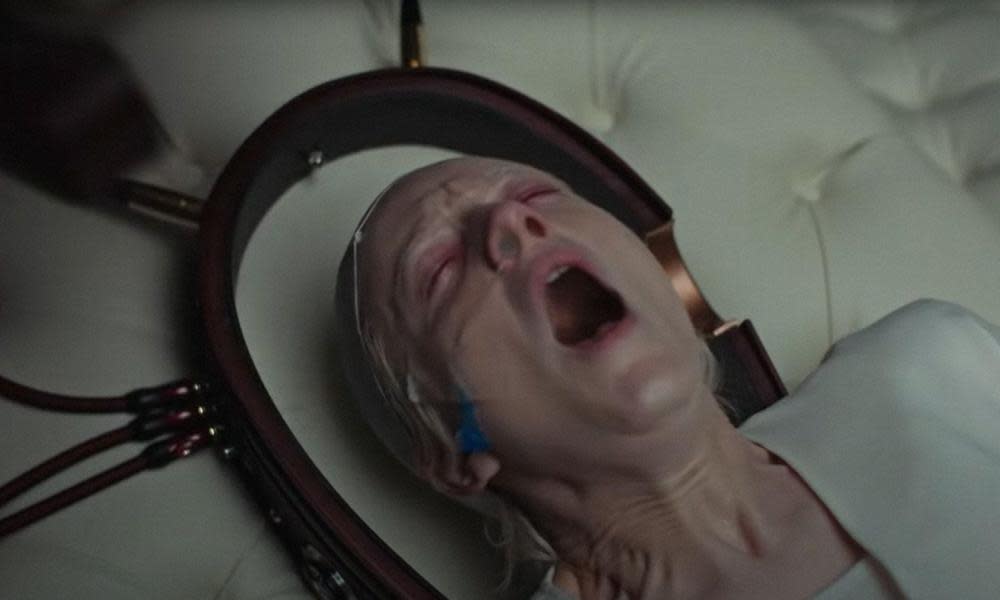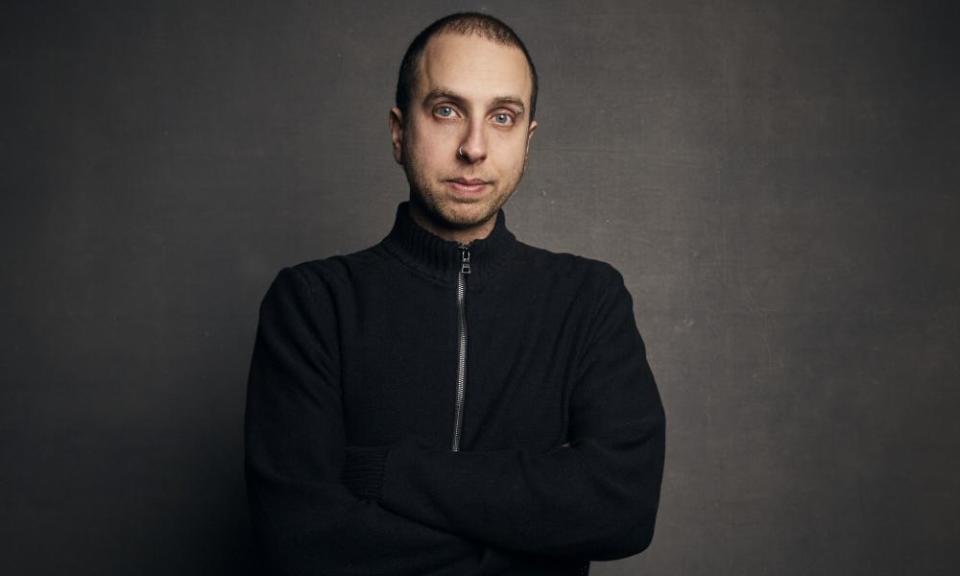Brandon Cronenberg on gougings, knifings and pokerings: 'CGI is too floaty and unreal'

Brandon Cronenberg has the sniffles. This would not be worthy of note, but for the fact that the 40-year-old Canadian film-maker, son of horror pioneer David, made his directorial debut in 2012 with Antiviral, about a clinic that harvests diseases from celebrities. For the right price, patients can be infected with Hollywood herpes, or catch the exact strain of flu that caused their favourite singer to cancel a tour. So whose cold is he wearing? “Nothing so interesting,” says Cronenberg through a bunged-up nose. “It’s just sinus trouble. Sorry, I didn’t mean to be disgusting.”
It’s a bit late for that, as anyone who has seen his films will attest. In Antiviral, restaurants serve steaks cultivated from A-list muscle tissue – while his new psychological horror, Possessor, features assassins who inhabit people’s bodies via neural implants, then use them as puppets to carry out hits. One such operative, played by Andrea Riseborough, is having difficulty negotiating the work-life balance. Although equipped with a gun, she takes it upon herself to sever her victim’s jugular instead. The stabbing felt “in character”, she says during her debriefing, to which her boss, played by Jennifer Jason Leigh, asks: “Whose character?” Decanted into another patsy, Riseborough goes wild, driving a poker into her target’s mouth and breaking his teeth like biscuits, before gouging out an eyeball for good measure.
Cronenberg wonders if the film’s violence has provoked comment because it was achieved practically rather than with pixels. “CGI violence feels a little floaty and unreal,” he says. “People have been shocked about the eyeball moment, but there’s an incredibly graphic knife to the eye in John Wick 3. It’s just that the reaction is less strong there because it’s digital. There’s a tactility that’s lost when you abandon practical effects. The needles inserted into scalps in Possessor – that’s actual hair punched into exquisitely crafted fake heads!” He sounds excitable, like a child showing off his bug collection.

Riseborough is playing someone who’s playing someone. Is the film partly a disquisition on acting? “There’s an element of that. Andrea and I talked about which real-world jobs she could draw on, and she said, ‘Please don’t say acting.’ Well, it kind of is acting. I was also thinking about those drone pilots who have PTSD despite being physically removed from war. But it’s really about the acting we do in our day-to-day lives. We all build these characters. All people are collaborative fictions.”
He noticed it himself while promoting Antiviral. Answering the same questions for months on end, he became a performative version of his usual self. “It was the psychological equivalent of seeing your image caught on video by accident. You feel this strange distance. We tend to imagine ourselves as these unified, cohesive wills, but we’re all a chaos of conflicted voices, impulses and ideas. There’s some fascinating science around how our microbiome can influence our behaviour. Not just our own cells but the micro-organisms in our digestive tracts.” It’s schoolboy bug collector time again.
Possessor also touches on corporate and governmental surveillance. “The Snowden leaks happened while I was writing the film,” says Cronenberg. “We knew we were being watched, but it was way worse than anyone had imagined. Privacy is a kind of power that can be taken from you.” Not that Cronenberg is claiming the moral high ground. “As much as I’m coming off like some technophobe hermit, I actually love technology. To be truly secure, you’d have to not exist as a person in the world.” We could always have conducted this interview by mail rather than Zoom. “I should’ve insisted on that,” he says, sounding so delighted that I half expect him to rush out and buy the stamps.
Asked about his father and the similarities between their films,he visibly slumps, resorting to the stock answers he has given ever since he began granting interviews: he’s too close to his own films to recognise any overlap with his father’s, he says, and all he can do is follow honestly his creative impulses. Yada yada.
Perhaps he genuinely can’t see that Possessor echoes his father’s gaming thriller eXistenZ (which also starred Leigh), or that Antiviral repeats motifs from Rabid, Shivers and Videodrome, or that their work shares an inquisitive, deadpan sensibility. Given the eight-year gap between his two features, which was caused by financing problems, the Cronenberg name certainly isn’t helping get his movies made.
Related: Possessor review – terrifying sci-fi horror freak-out | Peter Bradshaw's film of the week
“That’s kind of the joke,” he laughs. “I know people who aren’t related to film-makers and they’re making movies every year.” Did he ever consider directing under another name? “Briefly. But we live in an era where you can’t hide that sort of thing.” At least the more films he makes, the fewer questions he’ll be asked about his father. “I wonder. Denise Crosby, whose grandfather was Bing, once said, ‘They’ll always ask.’”
Why not join forces with Sofia Coppola, Jason Reitman and Jennifer Chambers Lynch in a support group for directors who are tired of being quizzed about their film-maker parents? “That would be a very obnoxious support group,” he says with a wince. It may be one of the few ideas that could make a Cronenberg squirm.
• Possessor is in cinemas and available on digital platforms now.

 Yahoo Movies
Yahoo Movies 
